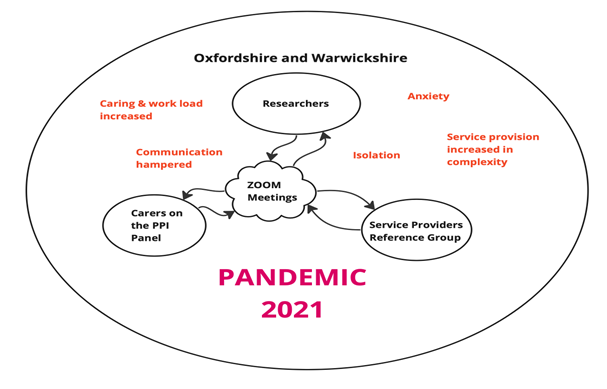In this Blog Post, Chris Lawes, Debs Smith and Ruth Graham reflect on their experiences of being involved in a PPI Panel in 2021 for the research on accessing and navigating dementia services and support.
In this Blog post there are links (in blue and underlined) to click on where you will see more information, diagrams in larger detail and resources.
What is Patient and Public Involvement (PPI) and why is it important?
PPI in research is when researchers work with patients/members of the public to develop ideas for research, to produce study materials (e.g., information sheets to be given to potential participants), to think about the findings from research and how to let others know about results from a study. The government and research funding bodies now recognise its value and require this because PPI members provide a unique insight into a research topic and can help to ensure that research money is used well.
Who was involved in the PPI group?
PPI members were recruited from November 2020 through until January 2021. This was during a time of lockdowns. Service providers, carers groups and research networks were contacted, all of whom distributed our PPI invitation leaflet.
We formed a PPI group of eight members; four from Warwickshire, four from Oxfordshire. All were carers and had experience of using dementia care services within Oxfordshire or Warwickshire in the past 5 years. Some of us were new to being part of a PPI group; others were familiar with this work.
The PPI group met over Zoom together with Chris as PPI Chair and Rene as Principal Investigator. The PPI Chair and two members also attended the Reference group meetings (see blog post #1). The PPI Chair was a member of the Research Team.
We held three PPI Panel meetings in 2021. In those meetings, PPI members discussed:
- the survey of literature undertaken by the Research Team;
- problems facing carers and people with dementia accessing and navigating services (see blog post #2);
- the research question wording for the study;
- the ethics application for a study that involved interviewing 20 people with lived experience of dementia, including information for potential participants about taking part (1);
- a draft application for research funding submitted in October 2021;
- the impact of PPI for the project and their experience of research.
What impact did the PPI Panel have?
Between February and July 2021, we kept a record of actions taken by the Research Team in response to PPI feedback. We analysed all the notes of the PPI meetings that we had held. We found that there were 35 actions recommended by members of the PPI Panel, of which 29 were acted upon by the Research Team. Three examples are shown below.
PPI Feedback | Research Team Actions | Outcome |
Research Question (RQ) Wording. The RQ wording is actually two questions: the first is how to help people to navigate the system; the second is how to get them the care and support that they and their families need. Is this intended? These raise different issues. | Produce a clearer RQ to be discussed at next PPI meeting. | New RQ produced and agreed with PPI panel. New RQ used in ethics application 2021. |
Research Priority. Fragmentation. Such is the fragmentation of services that carers can find themselves telling one service about the existence of another. | Produce information in a format that enables information about services to be held in one place. | Agreed by the Research Team that information should be in a format that enables information to be more centrally held. Examples of visual approaches were reviewed by the PPI panel meeting in 2021, at the PPI Visual Approaches workshop in 2022, and with service providers in the Reference Group (see blog post #3). |
Research Design. Plain English and Tone. Some people with dementia may find an official tone or format intimidating and it may even cause confusion and distress. Any written communication should be clear and friendly. Documents need to be put into a form that is readily understood by all. | Documents rewritten by experienced PPI Contributors to check and amend for tone and for the use of plain English. | Redrafted documents submitted as part of the successful ethics application in 2021. |
What were PPI members’ experiences of being involved in the project?
We asked PPI members to reflect on their experiences with a semi-structured questionnaire. Five overarching themes emerged: (1) Desire to help others/make a difference; (2) Sharing experiences; (3) Confidence/wellbeing; (4) Feasibility, format and wording of visual diagrams; and (5) Process of PPI and impact on participants. We found that within each of these themes there were positive and challenging aspects to being part of the PPI Panel.
Conclusions: What we have learnt
- Limitations vs advantages of meeting on-line (virtual working).
The selection of PPI members was biased towards those who were already networked into service providers and were able to use technology during this challenging time. The advantage of working virtually was that we could meet while spread over two counties. The disadvantage was we were not so easily able to build trusting relationships as a PPI Group and discuss detailed information. The effect of virtual working was to hamper the really important work of all three groups (PPI, Reference Group and Research Team) being able to fully listen and interact with each other.
- Access to resources.
We could not find appropriate training relevant to PPI in dementia research. This included training in how to manage the emotional burden of sharing personal experiences, which some members said they would have valued. A report in the Patient Experience Library (2023) confirms that this is a problem.
- PPI takes a long time – realistic expectations.
It can take a long time to gain funding for research; and inevitably not all applications are successful. We didn’t realise it would take years. This needs to be discussed and expectations managed for future PPI Panels.
- Discontinuities in the process due to work and life pressures for service providers, researchers and PPI members.
The pandemic caused increased demands and pressures for everyone involved in the project, including our PPI Panel. We compensated by the PPI Chair keeping in touch with everyone individually, including checking in with them before and after meetings, to keep them actively involved.
- PPI needs to be front and centre in any funding application.
Future research funding applications need to have a strong PPI narrative throughout the whole bid, with this work clearly documented. The application form for the funding we sought in 2021 had a 1000-word limit, which was inadequate to describe all the work undertaken for PPI. This may have been a reflection of all the pressures on research at this time. In May 2022, it was decided that a Participatory Action Research (PAR) approach was needed, and that we should write Blog posts to demonstrate the work and influence of PPI on the research process.
We will continue to have a strong PPI element to research we undertake going forward, and future grant applications we develop on this topic of accessing and navigating dementia care services.
We would like to thank all the PPI Contributors and Volunteers who gave generously of their time, commitment and skills to this project in 2020 and 2021.


